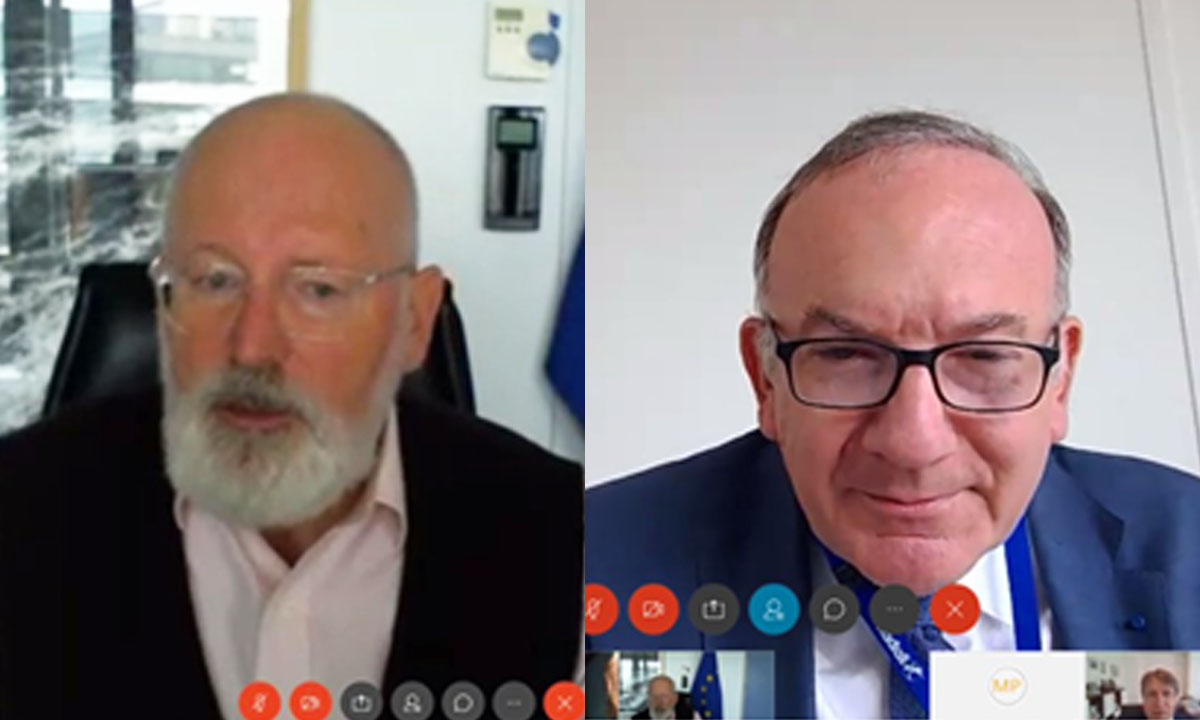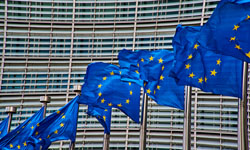BusinessEurope Headlines No. 2020-23
Green Deal must ensure a robust economic recovery

“European businesses are committed to help make the Green Deal a true success regardless of the COVID-19 pandemic. We will remain a constructive, but pragmatic voice to support you in your difficult job to deliver an effective Green Deal”, said BusinessEurope President Pierre Gattaz to European Commission Executive Vice-President Frans Timmermans in a videoconference on 16 June. He also underscored the need to be vigilant on Europe’s competitiveness, making clear that our businesses will not be able to compete without the existing system of free allowances of the EU Emissions Trading System in many sectors. Finally, Gattaz stressed that the impact assessment that the European Commission is conducting to possibly increase Europe’s 2030 climate targets should include more elements to make it fit for the future. “The impact assessment should assess the long-term impacts of COVID-19 on the ability of Member States and sectors to reach higher 2030 climate ambitions”, he pointed out. Linked to this, Gattaz added, is the carbon leakage risk due to the difference in climate ambition between Europe and other major economies. “This risk should be assessed based on future carbon prices, which are expected to be much higher than what we’ve seen in the past”, he concluded.
Contact: Leon de Graaf
Discussing EU social dimension with Commissioner Schmit
 On 16 June, BusinessEurope's Social Affairs Committee members had an exchange with the European Commissioner for Jobs and Social Rights, Nicolas Schmit, on a broad range of EU employment and social policy topics. BusinessEurope Director General, Markus J. Beyrer stressed that the Commission’s recovery plan is a bold first step. We now need to ensure that it is going to invest the resources made available on important and essential reforms for our countries to strengthen their long-term growth potential and ensure that people can go back to work as quickly as possible. During the discussion, the need for a renewed tripartite approach to Europe’s social dimension was highlighted. The European semester and labour market reforms will play a key role to invest resources where they are mostly needed to strengthen national economies and labour markets, and to make them more resilient to shocks in the future. The European response to the crisis should not overlook the need to address long-term challenges to improve the performance of labour markets and social systems. Access to a sufficiently skilled workforce is also a key factor for Europe’s competitiveness and productivity gains.
On 16 June, BusinessEurope's Social Affairs Committee members had an exchange with the European Commissioner for Jobs and Social Rights, Nicolas Schmit, on a broad range of EU employment and social policy topics. BusinessEurope Director General, Markus J. Beyrer stressed that the Commission’s recovery plan is a bold first step. We now need to ensure that it is going to invest the resources made available on important and essential reforms for our countries to strengthen their long-term growth potential and ensure that people can go back to work as quickly as possible. During the discussion, the need for a renewed tripartite approach to Europe’s social dimension was highlighted. The European semester and labour market reforms will play a key role to invest resources where they are mostly needed to strengthen national economies and labour markets, and to make them more resilient to shocks in the future. The European response to the crisis should not overlook the need to address long-term challenges to improve the performance of labour markets and social systems. Access to a sufficiently skilled workforce is also a key factor for Europe’s competitiveness and productivity gains.
Contact: Maxime Cerutti
 Comprehensive and ambitious EU-UK agreement must be reached in time
Comprehensive and ambitious EU-UK agreement must be reached in time
The European business community released a statement on 14 June highlighting their extreme concern by the lack of progress in the EU-UK negotiations. There are just few months left for both sides to reach an agreement and it seems talks are in a deadlock. Avoiding cliff-edge must be a priority for the EU and the UK. The COVID-19 crisis is already responsible for an unprecedented economic slowdown of 10% on average in Europe. The last thing we need is adding further disruption while companies and citizens are struggling to come out of this crisis.
![]() Contact: Luisa Santos
Contact: Luisa Santos
Skills Agenda should recognise role of social partners in employee training
 It is important that the upcoming Skills Agenda outlines measures to further boost the attainment of STEM and digital skills, as part of a renewed approach to up-skilling and re-skilling workers. Social partners have a key role to play, both at cross-industry and sectoral levels. Policy-makers should focus their efforts on creating incentives for employers to invest and workers to participate in training activities. These were the key messages given by BusinessEurope Director General, Markus J. Beyrer, during a meeting with European Commission Vice President Schinas and Commissioner Schmit on 11 June. Taking into account variations in national systems and practices, BusinessEurope considers that a broadly social-partner led approach to employee training will deliver more effective and efficient outcomes than a purely individualised support mechanism, such as a learning account. Moreover, EU level benchmarks could play a positive role to support Member States’ reform agenda, for example, to improve the timeliness and effectiveness of education and training systems in terms of updating qualifications to changing jobs demands.
It is important that the upcoming Skills Agenda outlines measures to further boost the attainment of STEM and digital skills, as part of a renewed approach to up-skilling and re-skilling workers. Social partners have a key role to play, both at cross-industry and sectoral levels. Policy-makers should focus their efforts on creating incentives for employers to invest and workers to participate in training activities. These were the key messages given by BusinessEurope Director General, Markus J. Beyrer, during a meeting with European Commission Vice President Schinas and Commissioner Schmit on 11 June. Taking into account variations in national systems and practices, BusinessEurope considers that a broadly social-partner led approach to employee training will deliver more effective and efficient outcomes than a purely individualised support mechanism, such as a learning account. Moreover, EU level benchmarks could play a positive role to support Member States’ reform agenda, for example, to improve the timeliness and effectiveness of education and training systems in terms of updating qualifications to changing jobs demands.
Contact: Robert Plummer
 Europe and Japan should take the lead in post-Covid economic recovery
Europe and Japan should take the lead in post-Covid economic recovery
“This economic crisis is one which affects the entire world simultaneously and is unprecedented in living memory. Controlling the virus while preserving our economies and societies therefore requires an equally unprecedented and coordinated strategy. As developed economies and leading trading blocs, the EU and Japan should take the lead in showing the right path to recovery”, said Luisa Santos, Deputy Director General at BusinessEurope, during a webinar organised by the European Delegation in Japan. The WTO expects the annual trade flows to fall by between 13-32% in 2020 compared to the previous year. The value of global trade as a percentage of global GDP amounts to almost 60%. Santos pointed out that the crisis has shown how interdependent we are on pharmaceutical and healthcare products, and has also demonstrated the importance of ecommerce in allowing consumers to purchase essential items online and across borders. “Trade will be an important part of the recovery, and the EU and Japan should take the lead in preserving multilateral and rules-based trade. Important steps could be taken in, for example, updating the WTO pharmaceuticals agreement, and expediting the negotiations on ecommerce”, she concluded.
Contact: Maurice Fermont
EU foreign subsidies instrument to address market distortions
 The European Commission on 17 June released its White Paper on levelling the playing field as regards foreign subsidies. BusinessEurope welcomes the objective to ensure fair market conditions for all economic operators and to address all distortive impacts. "The European business community would like to see this instrument to be comprehensive, filling existing legal gaps and effectively addressing market distortions generated by foreign subsidies. We need to level the playing field for companies while ensuring that Europe remains open to trade and investment as this is critical for our recovery", said Director General Markus J. Beyrer. In January this year, BusinessEurope released a comprehensive position paper "The EU and China addressing the systemic challenge". The paper identified a number of market distortions in the areas of trade, investment, procurement and competition that have foreign subsidies as one of their main root causes. It calls for a whole-of-government approach towards tackling these distortions that involves complementarity across different policy areas. "In some cases, trading partners are not respecting their international commitments within the World Trade Organisation, for instance by not notifying state subsidies. In other cases, legislative loopholes are being explored to gain market advantage and prevent fair and open competition, like in the case of trade in services. We hope this new instrument will be effective in addressing market distortions while providing legal certainty to economic operators", Beyrer added. BusinessEurope is ready to engage actively in this process and provide the business views during the incoming public consultation.
The European Commission on 17 June released its White Paper on levelling the playing field as regards foreign subsidies. BusinessEurope welcomes the objective to ensure fair market conditions for all economic operators and to address all distortive impacts. "The European business community would like to see this instrument to be comprehensive, filling existing legal gaps and effectively addressing market distortions generated by foreign subsidies. We need to level the playing field for companies while ensuring that Europe remains open to trade and investment as this is critical for our recovery", said Director General Markus J. Beyrer. In January this year, BusinessEurope released a comprehensive position paper "The EU and China addressing the systemic challenge". The paper identified a number of market distortions in the areas of trade, investment, procurement and competition that have foreign subsidies as one of their main root causes. It calls for a whole-of-government approach towards tackling these distortions that involves complementarity across different policy areas. "In some cases, trading partners are not respecting their international commitments within the World Trade Organisation, for instance by not notifying state subsidies. In other cases, legislative loopholes are being explored to gain market advantage and prevent fair and open competition, like in the case of trade in services. We hope this new instrument will be effective in addressing market distortions while providing legal certainty to economic operators", Beyrer added. BusinessEurope is ready to engage actively in this process and provide the business views during the incoming public consultation.
Contact: Luisa Santos
Legal priorities for the recovery discussed with Cabinet Reynders
 Isabel Perignon, Deputy Head of Cabinet, and Bénédicte van Ormelingen, member of Cabinet of Commissioner for Justice Didier Reynders, attended a meeting of the Legal Affairs Committee on 12 June. The Commission gave an overview about the measures taken during the COVID-19 pandemic and briefed the group on the plans around sustainable corporate governance and the upcoming European Consumer Strategy. Members shared the challenges faced by companies during COVID-19, ranging from disruption of supply chains to the organisation of general shareholder meetings in a time where mass gatherings are still prohibited or severely limited. Members also stressed the importance in the recovery to look into initiatives that enable businesses (e.g. fighting fragmentation of rules, increased digitalisation of administrative proceedings, swifter implementation of the pre-insolvency directive), in particular smaller companies, to be able to bounce back quicker from the ongoing crisis.
Isabel Perignon, Deputy Head of Cabinet, and Bénédicte van Ormelingen, member of Cabinet of Commissioner for Justice Didier Reynders, attended a meeting of the Legal Affairs Committee on 12 June. The Commission gave an overview about the measures taken during the COVID-19 pandemic and briefed the group on the plans around sustainable corporate governance and the upcoming European Consumer Strategy. Members shared the challenges faced by companies during COVID-19, ranging from disruption of supply chains to the organisation of general shareholder meetings in a time where mass gatherings are still prohibited or severely limited. Members also stressed the importance in the recovery to look into initiatives that enable businesses (e.g. fighting fragmentation of rules, increased digitalisation of administrative proceedings, swifter implementation of the pre-insolvency directive), in particular smaller companies, to be able to bounce back quicker from the ongoing crisis.
Contact: Pedro Oliveira
Calendar 
- 22-26 June: EU Sustainable Energy Week 2020
- 9-10 September: 8th International Conference on Sustainable Development
- 12-15 October: 18th European Week of Regions and Cities
Reminder: please have a look at our privacy policy